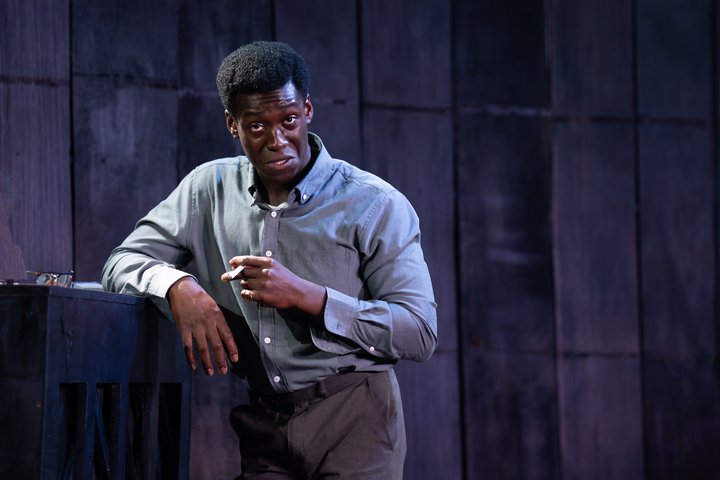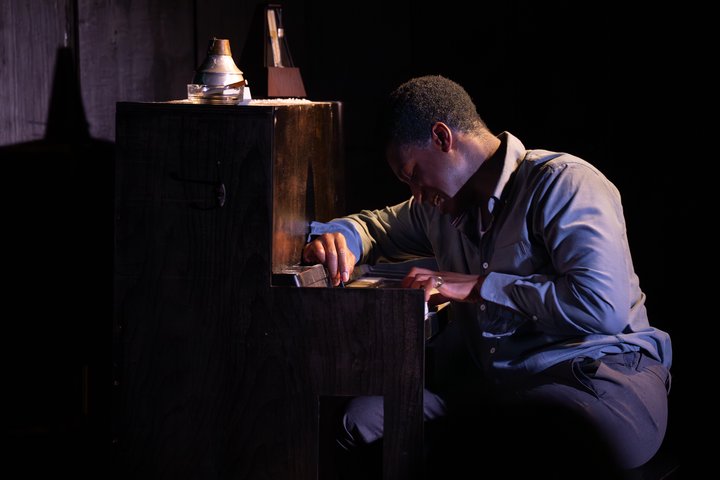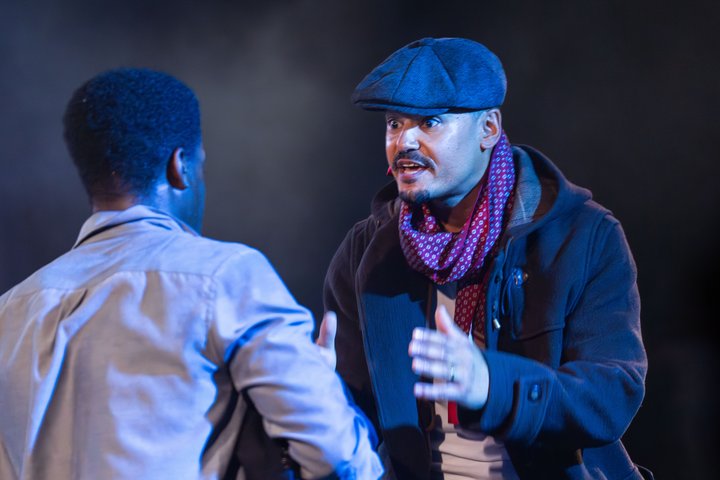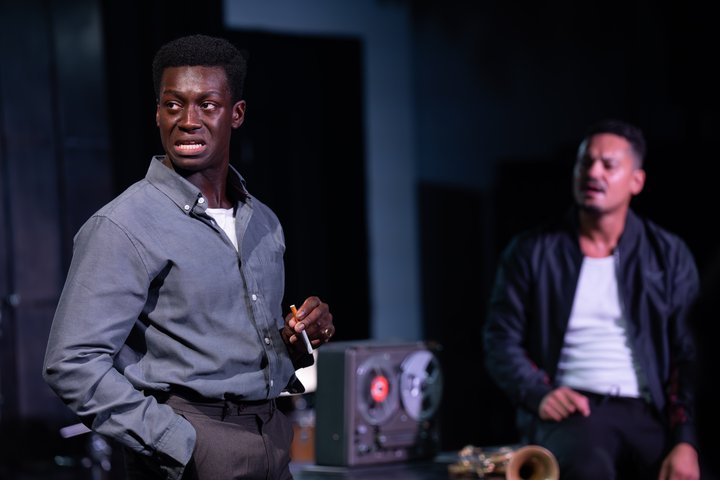Graduate interview: Benjamin Akintuyosi, BA Acting 2025
Benjamin Akintuyosi’s first professional role after graduating was playing legendary jazz trumpeter Miles Davis in new play Miles at the Edinburgh Fringe Festival this summer.
Benji received the Alex Beckett Award in 2025, which is an award in the memory of Welsh RADA acting graduate Alex Beckett.
You might have seen him last year in RADA productions of Is God Is, The Three Sisters and Come From Away.
We caught up with him to find out about his Edinburgh experience, and how he’s reflecting on his time at RADA.

Tell us about Miles
Miles Davis was a deeply complicated genius who revolutionised music. Miles shows the impact of his album A Kind of Blue through conversations between a contemporary young musician (played by jazz trumpeter Jay Phelps) and Miles. The young musician is trying to understand Miles’ genius so he can step into his own. The question the play is posing is really, ‘how much do we do for our art and how much are we willing to sacrifice for it?’
It was a really intense watch for the audience; a two-hander in an intimate venue. How was it surviving a full run of the production at the Fringe?
It was a real test of everything, all at once. You’re setting up the stage before the show and at the start of the run I was like, ‘this is horrible,’ but by the time the show closed it had become a ritual that helped us step into the world of the play. We had a very specific process that helped me get out of my head and drop the performance into my body, which is always the aim.
You play Miles at two times in his life during the show, and at the second moment he has had throat surgery, giving him a really distinctive speaking voice. How did you nail that?
I’d used Miles Davis’ voice just randomly while I was preparing for a production of Is God Is at RADA. I was looking for a voice to help me develop my character when I found Miles’ and at that point I didn’t know anything about him and started to look into him a bit. Then at the end of the third year, I got this self-tape audition invite through for Miles, it felt like an amazing coincidence.
The voice training I’d had definitely helped me, knowing how to use the creak in my voice without straining the throat. His voice post-surgery sounds unhealthy and rasping, but I know now how to do it in a way that I can sustain the vioce without damaging it.
You sang and played the piano in a couple of your RADA productions. Did your musicality help you with the production?
I did more music than acting at school, and I grew up in a church with my mother as the Choir Master so I was around a lot of music when I was younger. The three years at RADA were probably the ones when I’d been furthest from music in my life. It’s only been recently that the two passions have married up, and it’s been interesting to thread music back into my work and make it dramatic.

Has RADA’s impact on your performance work been different to what you thought it was going to be?
People have asked me whether going to drama school is necessary, and of course, you’ll always continue to learn by practising your craft. But what I think RADA did for me was elevate what I was already trying to do, by laying solid foundations. It taught me to be more certain of my creativity and imagination. The training helped to isolate certain areas of your performance and process, but you have to maintain your sense of self. And that’s hard to do when you have so many people looking at your work. But I realised along the way how important it was to hold on to the spark you brought with you, and the training will complement that.
It's a wonderful playground in which to experiment, and I’m taking that with me into everything.
What surprised you most about RADA when you started studying here?
The teachers really cared about not putting too much pressure on us, particularly in the first year. Considering how young I was at the time, that was really beneficial to me, because I knew I was going to put that pressure on myself.
What do you think is a misconception about RADA?
It doesn’t give in to the weight of its name, elitism or anything. While you’re in it you’re not thinking about its reputation, which is freeing for your creativity.
You studied at Gorseinon College in Wales, coincidentally where Alex Beckett studied. How important was the support you received in Wales for your journey to RADA?
When I decided to apply for drama school, I researched actors I admired to see what their career journey had been, and looking at Welsh actors like Ioan Gruffudd, Anthony Hopkins and RADA was coming up a lot. I saw Taron Egerton in Legend and when I realised he went to RADA I was like, ‘cool.’ I sent a tape, very last minute, but I had the support of so many acting teachers from Arts Academy where I used to train and they were the catalyst for making me think this was possible.
We shot the tape in an old tattoo parlour; it was very quick, high stakes and I think that helped the energy in the tape. I got a call back and everyone was getting very excited which started to make me realise what a big deal it was.
It felt like all of Wales was behind me, like ‘let’s make this happen’. I’m still in touch with the people who supported me and I would love to help out with acting workshops and new writing development in the future.

Do you have any tips for people auditioning for RADA this year?
Hang on to the things that creatively inspire you and motivate you. Towards the end of the audition process I had let go of the need for it to happen, and I started to connect with my imagination and have fun. That’s the key to unlocking what you’re trying to do.
Being open and letting go of your ego will always help you discover something new and keep learning.
Photographer: Colin J Smith

